Futures Slide, Gold Soars Ahead Of Inflation Data Amid Tariff Turmoil
US equity and global stock markets slumped while gold topped a fresh all time high as investors braced for today's core PCE report, the Fed's preferred inflation metric, and continued to worry about the lasting economic damage of the trade war amid daily tariff news and a halt in progress on the geopolitical front, as the market now awaits the April 2 tariff announcements. As of 8:00am ET S&P futures are down 0.2% but off session highs, with the Nasdaq lagging -0.4% and small caps modestly higher; Mag 7 names are mostly lower premarket: AAPL -0.7%, AMZN -0.5%, while TSLA +1.6%. European and Asian stocks are also lower: Bond yields are lower and the USD trades near session highs. Commodities are mixed with base metals all lower this morning, but gold is making a new record high rising above $3,080 per ounce. Brent trades near session highs above $74/bbl. Looking ahead today, we will get PCE data for February at 8:30am (consensus expects headline and core PCE up 0.3% MoM, and 2.7%/2.5% YoY headline/core) followed by UMich survey data at 10am. Following the data, we will hear from Fed voter Barr and non-voter Bostic.
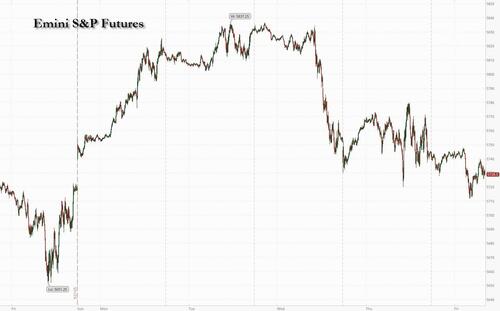
In premarket trading, Lululemon plunged 13% after the activewear maker’s annual forecasts for sales and profit disappointed, stoking worries that growth will continue to be weak in its American markets. Tesla is the top gainer among the Magnificent Seven (Alphabet -0.1%, Amazon -0.5%, Apple -0.7%, Microsoft -0.3%, Meta -0.1%, Nvidia +0.5% and Tesla +1.2%). US Steel (X) gains 5% after Semafor reported that the company is in active talks with Nippon Steel about a deal that would preserve their proposed merger citing unidentified people familiar with the matter. Here are some other notable premarket movers:
- Argan Inc. (AGX) climbs 12% after the builder of power plants posted 4Q revenue that climbed 41% from the year-ago period.
- Beam Therapeutics (BEAM) rises 4% after a Bank of America analyst upgraded the drug developer to buy, citing trial data of its investigative therapy for a genetic disease that can cause lung and liver damage.
- CureVac (CVAC) jumps 12% after the biotech firm said the European Patent Office had upheld the mRNA patent at the center of its legal battle with BioNTech.
- Hudson Pacific Properties (HPP) gains 7% after BMO raised the office REIT to outperform, saying its recent $475 million CMBS transaction helps provide “breathing room” on 2025 debt maturities.
- Nio Inc. ADRs (NIO) falls about 2% as the Chinese electric vehicle maker’s upsized share sale plan raised investor concern about dilution.
- Oxford Industries (OXM) declines 12% after the owner of Tommy Bahama and Lilly Pulitzer gave a disappointing forecast for the current fiscal quarter.
- Rocket Lab (RKLB) rises 9% after the space company was selected by the US Space Force for a $5.6 billion program.
- The Metals Company (TMC) gains 15% after the seabed mining company asked the Trump administration for approval to harvest the ocean floor for critical metals in international waters controlled by a United Nations-affiliated organization.
- WR Berkley (WRB) climbs 5% after Mitsui Sumitomo Insurance agreed to buy 15% of outstanding shares in the US insurer.
Overnight, Defense Sec Hegseth said to allies in his first official trip to Asia that the Trump Administration is set to "truly prioritize and shift to this region...in a way that is unprecedented." China's Xi continued to try woo international investors noting in a meeting with 40+ global business leaders that "we are providing a transparent, steady and predictable policy environment,” calling the nation a “favorite destination” for foreign investors. “Embracing China is embracing opportunities.” (BBG). After the close yesterday, Fed voter Collins said it looks “inevitable” that tariffs will boost inflation, at least in the near term, adding it’s likely appropriate to keep interest rates steady for longer (BBG). A 7.7 magnitude earthquake has struck in Myanmar, the most powerful in a century, causing buildings to shake and triggering evacuations in Vietnam and Thailand, with at least one tower collapsing in Bangkok.
It’s been a rough quarter for US equities, with the S&P 500 getting ready to close out the first three months of the year with a 3.2% loss, the worst performance since 2023. Today's reading for the US core personal consumption expenditures price index is expected to rise 0.3% in February, an unchanged pace compared with the previous month, according to the median economist forecast. With President Trump threatening to unleash so-called reciprocal tariffs next week, money managers say they’re turning neutral, stepping back or de-risking their portfolios.
“Tariffs are creating a lot of fears in the market, not just the level of the tariffs but the way they are implemented as well,” Valerie Genin, head of investments at Barclays Private Bank Monaco told Bloomberg TV. “It seems like investors are just digesting now that tariffs have lose-lose implications for all parties.”
Meanwhile in Europe, stocks are set for their third week of losses this month, as investors brace for US tariff announcements next week pushing the Stoxx 600 index 0.4% lower on Friday. Most sub-indexes on the Stoxx 600 regional benchmark notch declines. Banks lead the underperformance, while the real estate sector is a rare outperformer. Still, banks are the standout winner this quarter with a 26% advance as investors are counting on more strong earnings, share buybacks and M&A to drive gains. Here are the biggest movers Friday:
- Ubisoft shares jump as much as 12% after the video game maker said it will carve out a unit into a subsidiary with an enterprise value of about €4 billion, with Tencent to invest €1.16 to acquire a 25% stake in the new entity
- UK retailers are outperforming on Friday, after sales unexpectedly grew for a second month in February to suggest consumer confidence is returning; among the biggest gainers are B&M (+1.8%), Kingfisher (+2.2%), and ASOS (+1.1%)
- Grupo Catalana Occidente shares soared as much as 18% and to a record high after controlling shareholder Inoc launched takeover offer for all shares of the Spanish insurer
- SSE shares rise as much as 1.9% after the energy and utility company announced it is promoting current Chief Commercial Officer Martin Pibworth to become its next chief executive
- WH Smith shares slide as much as 3.1% after the company agreed to sell its struggling high street business at a price that JPMorgan said is at the lower end of expectations. The firm also said it is trading in line with market expectations
- Energiekontor, a German wind and solar parks project developer, sees its shares decline over 10%, the most since August after it reported disappointing results; shareholders will be subject to a significant reduction in dividends
- Rational shares drop as much as 1.9%, extending their drop following the muted growth outlook posted on Thursday. Analysts at Warburg cut their price target on the German company due to the softer outlook for this year
Earlier in the session, Asian equities suffered their biggest drop in a month, as concerns increased over a possible growth slowdown in the US stemming from new tariffs. Trading was halted in Thailand following an earthquake. The MSCI Asia Pacific Index fell as much as 1.4%, with most markets in the red. Toyota, Samsung Electronics and Mitsubishi UFJ were among the biggest drags. South Korean and Japanese stocks led the selloff, as ex-dividend trading exacerbated the impact of the hit to sentiment from US taxes on imports. President Donald Trump’s imposition of a blanket 25% levy on auto imports, and threats for similar action in other areas, have ramped up investor anxiety over the scope of the reciprocal tariffs that he intends to announce next week. The Hang Seng Tech Index, which has rallied this year on the back of Chinese technology advancements, fell to the brink of a correction amid broad risk-off sentiment.
In FX, the Bloomberg Dollar Spot Index is flat. JPY and GBP are the strongest performers in G-10 FX; SEK and NZD underperform. The greenback supported by month-end demand while it also modestly enjoys haven dynamics amid escalating trade tensions, a Europe-based trader says. The euro sank to session lows around 1.077 after traders ramped up bets on ECB interest-rate cuts as Spanish and French CPI undershot expectations. Money markets now price in about 60bps of easing by December.
In rates, treasuries hold gains in early US session led by long-end tenors with yields lower by about 4bp, arresting this week’s dramatic curve steepening. US yields are richer by at least 1bp across maturities with 2s10s curve flatter by ~2.5bp, 5s30s by ~2bp; 10-year near 4.33% is ~3bp lower on the day, with bunds and gilts in the sector outperforming by 1bp and 3bp. Core European bond markets lead after Spanish and French CPIs rose less than estimated, prompting traders to price in more easing by ECB. Focal point of US session is February personal income and spending data, which embeds PCE price index, inflation gauge targeted by the Fed.
In commodities, the non stop record highs in gold are the big story again: spot gold rose roughly $15 to trade near $3,072/oz after it hit a fresh record. Crude futures are steady. WTI drifts 0.1% lower to trade near $69.88. Brent is flat at $74.02.
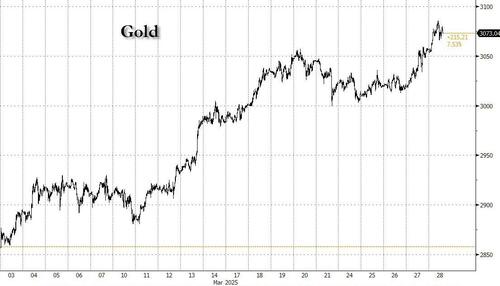
Today's US economic calendar includes February personal income/spending (8:30am), March final University of Michigan sentiment (10am) and March Kansas City Fed services activity (11am). Fed speaker slate includes Barr (12:15pm) and Bostic (3:45pm)
Market Snapshot
- S&P 500 futures down 0.4% to 5,714.00
- STOXX Europe 600 down 0.3% to 544.66
- MXAP down 1.0% to 186.56
- MXAPJ down 0.7% to 584.82
- Nikkei down 1.8% to 37,120.33
- Topix down 2.1% to 2,757.25
- Hang Seng Index down 0.6% to 23,426.60
- Shanghai Composite down 0.7% to 3,351.31
- Sensex down 0.5% to 77,227.72
- Australia S&P/ASX 200 up 0.2% to 7,982.01
- Kospi down 1.9% to 2,557.98
- German 10Y yield little changed at 2.72%
- Euro down 0.2% to $1.0777
- Brent Futures down 0.3% to $73.80/bbl
- Gold spot up 0.4% to $3,069.18
- US Dollar Index little changed at 104.37
Top Overnight News
- Elon Musk commented that their goal is to reduce the deficit by USD 1tln and will achieve most of that objective within a 130-day tenure, while he added that legitimate recipients of Social Security benefits will receive more, not less money, according to Fox News.
- Global bonds rallied as European consumer price data came in softer than expected and investors awaited data on the Federal Reserve’s favored inflation gauge.
- Inflation in France and Spain undershot expectations, supporting calls for more interest-rate cuts by the European Central Bank.
- The Zuffenhausen district of Stuttgart has been the heart of Porsche AG since the 1930s, and the sports car maker remains overwhelmingly Made in Germany, making it potentially the biggest loser in Donald Trump’s trade war.
- UK retail sales increased for a second month in February, suggesting consumer confidence is returning in a surprise boost for Chancellor of the Exchequer Rachel Reeves.
- The rally in European banking stocks shows few signs of cooling down after another stellar quarter.
- Fed's Collins (2025 voter) said she is cautiously and realistically optimistic about the economy and stated the economy started 2025 in a good place. Collins said inflation had come down but was still elevated at the start of the year, and the outlook now is much cloudier for inflation and growth. She noted it is inevitable that tariffs will increase inflation in the near term and it remains a question how long tariff-driven inflation will last. Furthermore, she said inflation risks are on the upside and she strongly supported the Fed's decision to hold rates steady, while she expects the Fed will likely hold rates steady for longer given the outlook and stated that watching inflation expectations and sentiment data is important right now.
- Fed's Barkin (2027 voter) said the current moderately restrictive stance is a good place to be and if conditions shift, the Fed can adjust. Barkin said given recent high inflation, tariffs could have more of an impact on prices, but still not known where rates will settle or how affected countries' businesses and consumers will respond. Barkin also commented that the direction of federal policy changes may be known, but the extent and how they net out in the economy remains uncertain, while he added federal policy changes create instability in the near term and the Fed is waiting for uncertainty to clear before acting.
A more detailed look at global markets courtesy of Newsquawk
APAC stocks were mostly pressured amid the ongoing themes of tariffs and growth concerns heading closer to next week's 'Liberation Day' and with markets also bracing for the latest US PCE Price Index. ASX 200 traded rangebound and was just about kept afloat by strength in consumer staples and the commodity-related sectors with gold miners rejoicing after the precious notched another fresh record high. Nikkei 225 underperformed and dipped beneath the 37,000 level as automakers continued to suffer from Trump's recent auto tariff proclamation and with firmer-than-expected Tokyo CPI data supporting the case for the BoJ to continue with future policy adjustments. Hang Seng and Shanghai Comp failed to sustain the early resilience and slipped into negative territory amid a deluge of earnings and tariff uncertainty, while it was also reported that China rejected US President Trump's offer of tariff waivers in exchange for a TikTok deal.
Top Asian News
- Chinese President Xi said, at a meeting with foreign CEOs, that foreign firms' investment plays an important role and China was, is and will certainly be an ideal, safe and promising investment destination for foreign business people. Xi added they will ensure that foreign-funded enterprises have fair access to factors of production in accordance with the law and maintaining a stable, healthy, and sustainable development of China-US relations is in the fundamental interests of the two peoples. Xi also stated that blocking someone else's path will only block your own path in the end and blowing out other people's lights will not make your own lights brighter. Furthermore, he said economic and trade frictions should be properly resolved through equal dialogue and consultation, and noted that China will handle China-US relations in accordance with the principles of mutual respect, peaceful coexistence and win-win cooperation.
- China is to promote high-quality development of the aluminium sector and will actively respond to trade frictions, according to a plan by ten government departments cited by Global Times.
- Japanese PM Ishiba said the impact of US auto tariffs on the Japanese economy could be very big.
- Bank of Japan March Meeting Summary of Opinions noted one member said inflation is somewhat overshooting expectations and a member said wage hikes in spring wage talks are somewhat exceeding last year's figures, with nominal wages rising at a pace in line with the achievement of the BoJ's price goal. There was the opinion that they don't have enough data to gauge the impact of the January policy change and recent long-term rate moves on the economy, while it was reiterated that the BoJ will continue to hike rates if economy and prices move in line with forecast, but should not have a preset idea on specific policy management. A member stated that for the time being, the BoJ must scrutinise US policy impact on the global economy and markets, as well as the effect of BoJ's past rate hike on Japan's economy, then move to the next rate hike, while a member said they must adjust the degree of monetary support nimbly to avoid a buildup of financial excess. Furthermore, there was an opinion that when they next hike rates, they must consider shifting the monetary policy stance to neutral from accommodative, and at the next meeting, they must scrutinise inflation expectations, the chance of upside price risk materialising, and progress in wage hikes when setting monetary policy.
European bourses started Friday trade on a cautious note, Euro Stoxx 50 -0.6%, after APAC stocks were pressured on tariff and growth concerns overnight, and ahead of next week’s "Liberation Day", and with markets also bracing for US PCE inflation data later today. Note, the risk tone took a hit generally on the morning's earthquakes in Myanmar. Sectors are mainly in the red, Banks lag with German names lagging while softer yields assist Real Estate names.
Top European News
- Magnitude 6.9 (initially reported 7.72/7.4) earthquake occurs in Myanmar, via GFZ; reports of buildings shaking in Bangkok & Hanoi. Thereafter, magnitude 6.37 earthquake occurs in Myanmar, via GFZ; shocks reported in the Yunnan Province of southwest China and in Bangkok.
- ECB's de Guindos says disinflation process is continuing, goal is for it to be reached in the coming months; caution is even more important at times of uncertainty. Trade war would mostly impact economic growth.
- ECB Consumer Expectations Survey (Feb): See inflation in next 12 months at 2.6% (prev. 2.6%); 3y ahead sees 2.4% (prev. 2.4%). Consumers’ nominal income growth expectations over the next 12 months increased to 1.0% in February from 0.9% in January.
FX
- DXY is attempting to claw back some of yesterday's lost ground with the USD currently firmer vs. all peers ex-JPY into PCE. Index remains within yesterday's 104.07-65 range.
- JPY is the current best performer after firmer-than-expected Tokyo CPI data, which is seen as a leading indicator for national price trends and effectively supports the case for further BoJ policy normalisation. USD/JPY has pulled back from the overnight peak @ 151.21 and made its way back onto a 150 handle. The next downside target comes via Thursday's low @ 150.05.
- EUR is under modest pressure and has faded gradually from the 1.08 mark against the USD. No reaction to the morning's data points or ECB speak. Thursday's base at 1.0732 and then the 200-DMA at 1.0729.
- GBP flat despite a blip higher on the morning's better-than-expected Retail Sales and upward revisions to dated GDP metrics. While this lifted Cable to a 1.2968 peak it proved fleeting.
- Antipodeans softer given the risk tone though action is limited given the lack of specific drivers for the region.
- PBoC set USD/CNY mid-point at 7.1752 vs exp. 7.2591 (Prev. 7.1763).
Fixed Income
- A firmer start to the session for the benchmarks given the tepid risk tone overnight and risk aversion entering the market on the sizable earthquakes in Myanmar.
- USTs hit a 110-24 peak but since pulled back modestly but remains comfortably clear of the overnight 110-15 base. The session ahead is focussed on US PCE.
- Bunds bid, USTs hit a 110-24 peak but since pulled back modestly but remains comfortably clear of the overnight 110-15 base. The session ahead is focussed on US PCE. Prelim. French and Spanish inflation this morning cooler than forecast, but spurred no move; ECB SCE maintained the inflation view.
- Gilts gapped higher by 25 ticks as the Gilt open roughly coincided with the high point in USTs and Bunds as the complex generally continued to climb on the broad risk tone. Since, the benchmark has eased slightly from highs but remains above the 91.00 mark. No hawkish follow through from the Retail and GDP data this morning.
Commodities
- Crude futures choppy with initial downside on broader risk aversion. Since, the benchmarks briefly moved into the green but only by around USD 0.10/bbl with the move fleeting and the benchmarks now essentially unchanged. WTI May at the top of a USD 69.53-70.05/bbl band, Brent May in-fitting in USD 73.63-74.15/bbl parameters.
- Precious metals mostly firmer despite the firmer USD, benefitting from the risk tone as discussed into key events. Spot gold is currently off highs in a USD 3,054.42-3,086.21/oz intraday range.
- Base metals are mostly lower, tracking sentiment, 3M LME copper resides in a USD 9,741.70-9,855.15/t range at the time of writing. Dalian iron ore prices also dipped overnight but still notched a weekly gain as hot metal output continued to increase in March - used as a gauge for iron ore demand.
Geopolitics: Middle East
- Israeli military said it intercepted one launch from Lebanese territory and another one was detected.
- Israeli Defense Minister said if there is no peace in Kiryat Shmona and the Galilee communities, there will be no peace in Beirut, according to Asharq News. It was separately reported that Israel's Defence Minister holds Lebanon responsible for firing on Galilee and said Israel will respond forcefully against any threats.
- Iran's ambassador in Baghdad said US President Trump's message to Tehran included a request to dissolve or merge the Popular Mobilization Forces, which is unacceptable to us, while the ambassador added they refuse to negotiate on their ballistic missiles and the decision to dissolve the PMU is an Iraqi decision which he thinks is impossible, according to Sky News Arabia.
- "Lebanese media: Israeli warplanes fly over Beirut", according to Sky News Arabia; thereafter, the Israeli Military says it will release an urgent statement to Beirut residents soon.
Geopolitics: Ukraine
- Russia and US teams may meet regarding Ukraine in Riyadh in mid-April, according to TASS.
- Russian President Putin suggested the possibility of placing Ukraine under temporary administration to allow for elections and signature of accords, according to Russian news agencies. Putin said Russia stands for resolving Ukraine conflict through peaceful means and wants to work with Europe on resolving Ukraine conflict, but the EU is acting inconsistently. It was separately reported that Putin said Russia welcomes a peaceful resolution to the Ukraine conflict "but not at our expense", according to CGTN Europe.
- White House said governance in Ukraine is determined by its constitution and the people of Ukraine.
- Russian Defence Ministry says Ukraine continued attacks on Russian energy infrastructure, according to Ria; attacked the Sudzha gas metering station on Friday and almost destroyed it; thereafter, Ukraine said Russia conducted the attack.
- Ukrainian Deputy PM confirms Ukraine has received new US draft of the minerals deal.
Geopolitics: Other
- CK Hutchison Holdings (0001 HK) will not go ahead with the expected signing of a deal next week to sell its two strategic ports at the Panama Canal, according to SCMP.
- US Secretary of State Rubio warned if Venezuela attacked Guyana or Exxon (XOM), "it would be a very bad day" for them. It was also reported that the Guyanese President agreed with the US to further integrate energy production after a meeting with US Secretary of State Rubio.
- US Defense Secretary Hegseth said during a visit to the Philippines that he and US President Trump want to express the ironclad commitment they have to the mutual defence treaty and are very committed to the Philippines-US alliance, friendship and cooperation they have. Hegseth added that friends need to stand shoulder to shoulder to deter conflict and ensure that there's freedom of navigation in the South China Sea, and noted that deterrence is necessary around the world, but specifically in this region considering the threats from the Communist Chinese. Hegseth later announced they are doubling down on the US-Philippines partnership and agreed on the next steps to re-establish deterrence in the Indo-Pacific with the US to deploy advanced capabilities to the Philippines.
US Event calendar
- 08:30: Feb. PCE Price Index MoM, est. 0.3%, prior 0.3%
- Feb. PCE Price Index YoY, est. 2.5%, prior 2.5%
- Feb. Core PCE Price Index MoM, est. 0.3%, prior 0.3%
- Feb. Core PCE Price Index YoY, est. 2.7%, prior 2.6%
- 08:30: Feb. Personal Income, est. 0.4%, prior 0.9%
- Feb. Personal Spending, est. 0.5%, prior -0.2%
- Feb. Real Personal Spending, est. 0.3%, prior -0.5%
- 09:00: Bloomberg March United States Economic Survey
- 10:00: March U. of Mich. Sentiment, est. 57.9, prior 57.9
- March U. of Mich. Current Conditions, est. 63.5, prior 63.5
- March U. of Mich. Expectations, est. 54.1, prior 54.2
- March U. of Mich. 1 Yr Inflation, est. 4.9%, prior 4.9%
- March U. of Mich. 5-10 Yr Inflation, est. 3.9%, prior 3.9%
- 11:00: March Kansas City Fed Services Activ, prior 2
DB's Jim Reid concludes the overnight wrap
Markets struggled yesterday as tariff fears remained at the forefront of investors’ minds, with concern mounting ahead of the April 2 deadline for reciprocal tariffs. Notably, several automakers took a hit given the 25% tariff announcement on Wednesday night. But more broadly, there were signs that investors were becoming increasingly concerned about the stagflationary consequences. Indeed, yesterday saw the US 1yr inflation swap (+9.1bps) hit a 2-year high of 3.11%, even as the real yield on 2yr Treasuries (-11.1bps) fell to its lowest since August 2022 at 0.73%. This combination of elevated growth uncertainty and inflation fears saw gold prices hit a new closing record of $3,057/oz yesterday, and overnight they’ve seen further gains up to $3,074/oz.
In terms of the last 24 hours, one of the main fears is that the reciprocal tariffs could lead to a big round of escalation beyond the initial US tariffs. For example, shortly before we went to press yesterday, President Trump said in a post that if the EU worked with Canada “in order to do economic harm to the USA, large scale Tariffs, far larger than currently planned, will be placed on them both”. Separately, Japan’s Prime Minister Ishiba said yesterday that “We must consider appropriate responses, and naturally all options are on the table”. And Canadian Prime Minister Carney said that he’d convened the Cabinet Committee on Canada-US relations “in response to President Trump’s attack on our workers and our industries.” Carney said that “nothing is off the table” but that the Canadian government would respond based on what the US does on April 2.
Against that backdrop, automakers struggled yesterday, with Ford (-3.88%) and General Motors (-7.36%) both losing significant ground. That was echoed across the world, and in Europe, the tariff announcement meant the STOXX Automobiles and Parts Index fell -1.09% to a fresh two-month low. That tariff uncertainty also dragged down equities more broadly, with both the S&P 500 (-0.33%) and the STOXX 600 (-0.44%) losing ground for a second day running. And with just two business days of Q1 left, the S&P 500 is on track to post its first quarterly decline in six quarters, having shed -3.20% since the start of the year.
The tariffs also meant that US Treasuries faced several hurdles, particularly with investors moving to price in more inflation. In fact by the close, the 10yr yield (+1.1bps) was up to a one-month high of 4.36%, as was the 30yr yield (+2.1bps) at 4.72%. By contrast, fears about the growth impact led investors to price in more Fed rate cuts this year, and the 2yr yield fell -2.6bps to 3.99%, even as inflation breakevens rose. In turn, that meant the 2s30s yield curve moved up to its steepest level in over 3 years. And this pattern was evident elsewhere, with the German 2s30s yield curve also up to its steepest since July 2022, at 106bps.
Despite the weakness among key assets, yesterday actually brought a respectable set of US economic data, which continued to point away from a sharp slowdown. For instance, the weekly initial jobless claims were at 224k over the week ending March 22 (vs. 225k expected), meaning there were still no obvious signs of a deterioration in the labour market. At the same time, we also got the third estimate of Q4 GDP, which was revised up a tenth, and now shows an annualised growth rate of +2.4%. So it continued the recent theme whereby the hard data is still holding up, even if some of the surveys have pointed to a weaker performance.
Here in the UK, gilts sold off in the aftermath of the government’s Spring Statement, with the 10yr yield (+5.1pbs) moving up more than its global counterparts yesterday. The rise took it up to 4.78%, its highest level since mid-January, whilst the 10yr real yield (+2.7bps) hit a post-2009 high of 1.35%. So that added to concerns that the government would need to announce further fiscal tightening later this year to keep within their fiscal rules, potentially repeating the pattern from the Spring Statement where higher yields and lower growth wiped out the fiscal headroom. As a reminder, our UK economist (link here) thinks that likely economic downgrades later in the year will lead to further fiscal consolidation.
Elsewhere in Europe, sovereign bonds rallied as investors were more concerned about the negative growth impact from the tariffs. So that led investors to dial up the likelihood of further ECB rate cuts, with the amount of further cuts priced by the December meeting up +2.8bps on the day to 58bps. And in turn, yields fell across the curve, with those on 10yr bunds (-2.2bps), OATs (-2.2bps) and BTPs (-1.8bps) all moving lower.
Overnight in Asia, the major equity indices have seen sizeable losses, with the Nikkei (-2.34%) and the KOSPI (-2.14%) both slumping. In Japan, matters weren’t helped by the Tokyo CPI report for March, which came in stronger than expected at +2.9% (vs. +2.7% expected). In addition, the measure excluding fresh food and energy moved up to +2.2% (vs. +1.9% expected), the strongest in a year. In turn, that’s added to the momentum for further rate hikes from the BoJ, and the Japanese Yen has strengthened +0.10% this morning against the US Dollar. Elsewhere in Asia, the Hang Seng (-0.85%), the Shanghai Comp (-0.65%) and the CSI 300 (-0.42%) have all experienced losses as well.
To the day ahead now, and there are several data releases to look out for. In the US, there’s PCE inflation for February, along with the University of Michigan’s final consumer sentiment index for March. Meanwhile in Europe, we’ll get the French and Spanish flash CPI prints for March, along with German unemployment for March and UK retail sales for February. From central banks, we’ll hear from the Fed’s Barr and Bostic, along with the ECB’s Nagel, and Muller.
Tyler Durden
Fri, 03/28/2025 - 08:26
 Click on graph for larger image.
Click on graph for larger image.



 Click pic... buy seeds... take food supply into your own hands...
Click pic... buy seeds... take food supply into your own hands...
 Via Reuters
Via Reuters
 Click pic, add to cart. Up to 20% off + free shipping with subscription and purchase of 3 or more bottles.
Click pic, add to cart. Up to 20% off + free shipping with subscription and purchase of 3 or more bottles. Via Reuters
Via Reuters


 U.S. Rep. Elise Stefanik (R-N.Y.) testifies before the Senate Foreign Relations Committee on her nomination to be ambassador to the United Nations, on Capitol Hill in Washington on Jan. 21, 2025. Saul Loeb/AFP via Getty Images
U.S. Rep. Elise Stefanik (R-N.Y.) testifies before the Senate Foreign Relations Committee on her nomination to be ambassador to the United Nations, on Capitol Hill in Washington on Jan. 21, 2025. Saul Loeb/AFP via Getty Images U.S. Army paratroopers assigned to 1st Brigade Combat Team, 82nd Airborne Division board an aircraft bound for the U.S. Central Command area of operations from Fort Bragg, N.C., on Jan. 5, 2020. U.S. Army/Spc. Hubert Delany III/Handout via Reuters
U.S. Army paratroopers assigned to 1st Brigade Combat Team, 82nd Airborne Division board an aircraft bound for the U.S. Central Command area of operations from Fort Bragg, N.C., on Jan. 5, 2020. U.S. Army/Spc. Hubert Delany III/Handout via Reuters

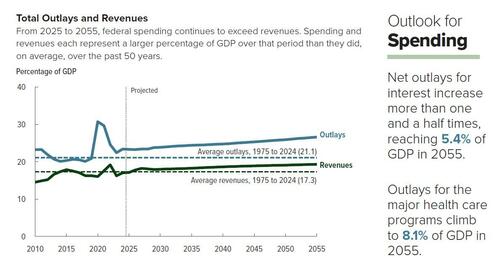
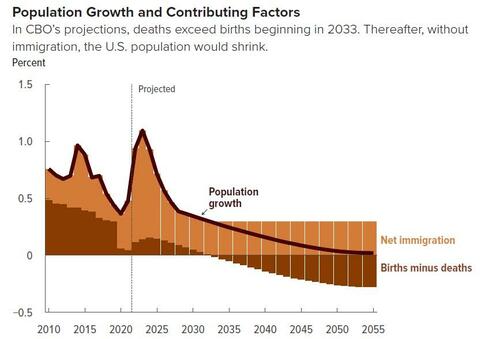
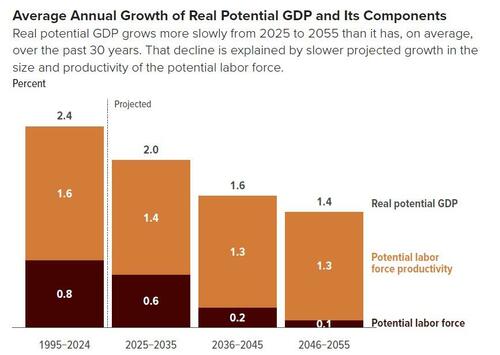
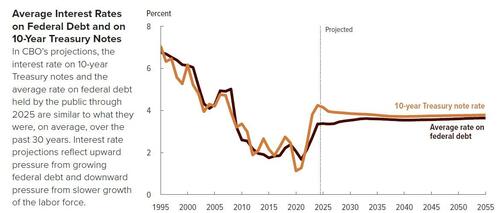

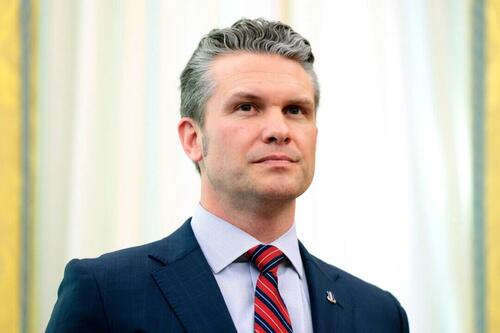 Secretary of Defense Peter Hegseth in the Oval Office of the White House on March 21, 2025. Anna Moneymaker/Getty Images
Secretary of Defense Peter Hegseth in the Oval Office of the White House on March 21, 2025. Anna Moneymaker/Getty Images Via Associated Press
Via Associated Press KCNA via Reuters
KCNA via Reuters





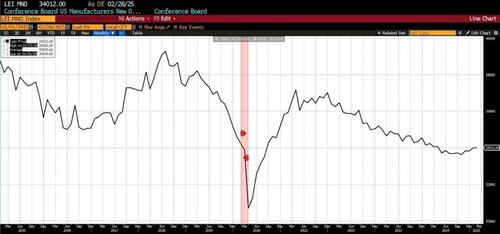
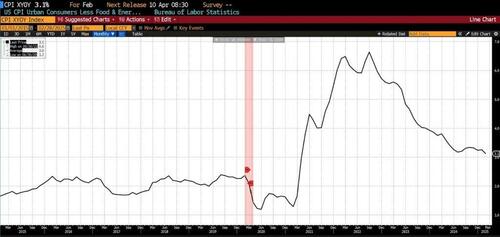
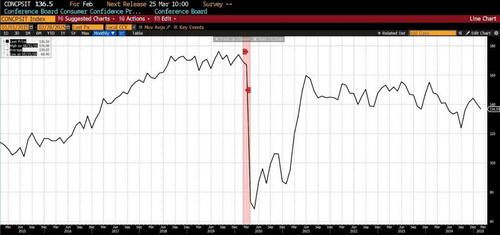
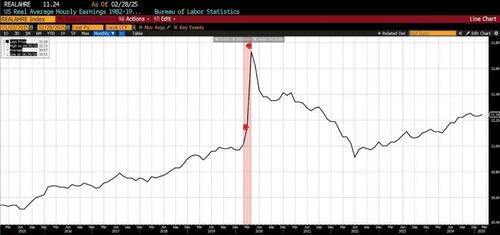
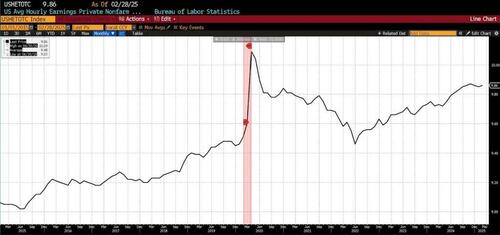
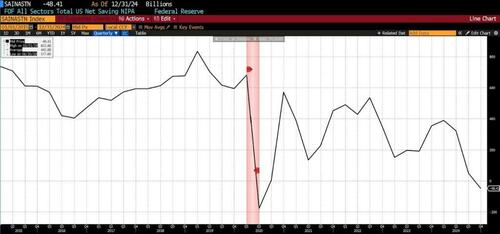
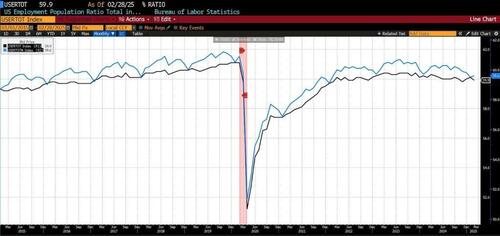
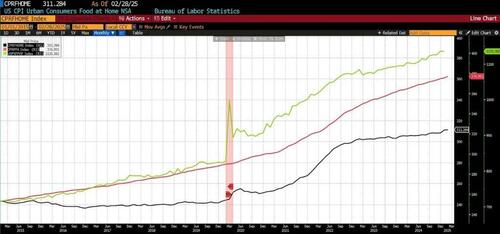
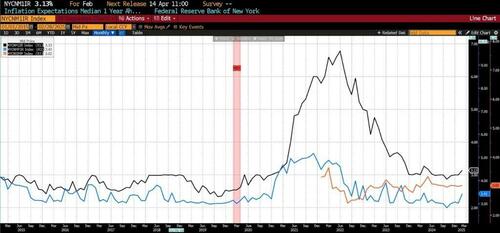

Recent comments